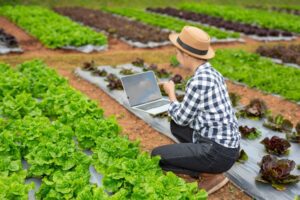Digital agriculture is an approach to intelligent farming that ensures optimum yield in quality and quantity, while using natural resources like water and agrochemicals intelligently by leveraging innovative technologies. This presents a potential opportunity when we consider that by the year 2050, we must produce 70% more food while accessing only 5% more farmland, according to UNFAO (United Nations Food and Agriculture Organization) estimates. Digital farming solutions are thus a great source of hope in this regard.
Digital agriculture leverages the geospatial and cloud-based farming solutions like geotagging, Machine Learning, and Artificial Intelligence in agriculture to enable all the stakeholders across the value chain to get comprehensive, real-time intelligence. Accordingly, they can work to ensure the better implementation of a Package of Practices (PoP), make timely interventions for emerging threats, and continually optimize to ensure the sustainable operations and best-in-class yields at each stage, paving the way to climate-resilient agriculture.

Key features to look for:
-
On-ground intelligence:
This collects the real-time data from farms and operational units by leveraging geotagging, satellite monitoring of crops, remote sensors, Internet of Things or IoT sensors, agricultural robots (Agribot) and industrial robots. As a result, stakeholders can instantly discover and address any change in the weather prediction, crop ecosystems, and the produce.
-
Data Analytics:
Understanding the ever-changing agricultural landscape can be overwhelming. This holds for companies with farms across geographies and smallholder farmers. Digital agriculture platforms employ crop and variety-specific historical intelligence and real-time data to present critical patterns as well as actionable data. They do so by deploying technologies like Artificial Intelligence and Machine Learning, blockchain, and big data, making the entire process completely effortless.
-
Information integration:
Timely and holistic information is the key to improved agricultural practices and operations. Digital agriculture tools make this doable due to cloud computing and data integration capabilities. A unified dashboard serves as the only source of truth for all stakeholders. Tools offer critical updates to the urban and rural users on the preferred channels, bridging stakeholder information gaps.
Short- to mid-term benefits of digital agriculture:
Implementing digital agriculture is beneficial across industries, geographies, and farm sizes. It enables accurate monitoring, optimized operations, and well-informed management. The end-to-end digitization permits industry stakeholders to improve yield quality and the volumes while meeting cost efficiency and sustainability goals. From farming and the seed companies to food processing and the Agri-input companies, organizations are increasingly implementing digitization of their farms and value chains. Government bodies, non-profit organizations, and lending entities also leverage such tools to make decisions that benefit one and all.
Key areas impacted by digital agriculture:
Some of the key areas in which digital agriculture makes an impact are:
- Farm performance and per-acre yield enhancement
- Yield prediction and risk mitigation
- End-to-end traceability and certifications
- Farmer enablement, engagement, and empowerment
- Demand forecasting and supply chain management
- Smallholder farms and sustainable livelihoods
- Adoption of climate-smart agriculture
These benefits become crucial when we consider the challenges that lie ahead for the agriculture and related industries. There is also increasing awareness and demand for produce grown responsibly by consumers and policymakers.
Given the intersecting food, water, energy and climate change challenges the world faces, embracing digital technologies for agriculture gives a significant opportunity. The next agricultural age is upon us and its universal prevalence is also inevitable, as proven by history. At SoilOptix®, we offer a wide range of available properties to provide the most in-depth look at your soil. Call our experts at +1(519) 902-SOIL(7645) today.
